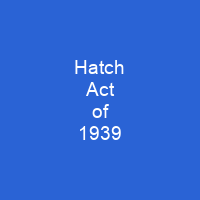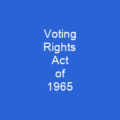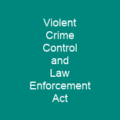The Hatch Act of 1939, An Act to Prevent Pernicious Political Activities, is a United States federal law. Its main provision prohibits civil service employees in the executive branch of the federal government from engaging in some forms of political activity. The Supreme Court has several times declined to hear challenges to the act and has twice upheld its constitutionality.
About Hatch Act of 1939 in brief
 The Hatch Act of 1939, An Act to Prevent Pernicious Political Activities, is a United States federal law. Its main provision prohibits civil service employees in the executive branch of the federal government from engaging in some forms of political activity. It became law on August 2, 1939, and was named for Senator Carl Hatch of New Mexico. The Supreme Court has several times declined to hear challenges to the act and has twice upheld its constitutionality. In 1973, in a case brought by the National Association of Letter Carriers, a 6 to 3 decision found the act neither too broad nor unclear. In 1975, the House passed legislation allowing federal employees to participate in partisan elections and run for office. In 1976, Democrats who controlled Congress had sought to win support by adding protections against the coercion of their superiors and federal employee unions. The Act bars state and local government employees from running for public office if any federal funds support the position. It has been interpreted to bar political activity on the part of employees of state agencies administering federal unemployment insurance programs and appointed local law enforcement agency officials with oversight of federal grant funds.
The Hatch Act of 1939, An Act to Prevent Pernicious Political Activities, is a United States federal law. Its main provision prohibits civil service employees in the executive branch of the federal government from engaging in some forms of political activity. It became law on August 2, 1939, and was named for Senator Carl Hatch of New Mexico. The Supreme Court has several times declined to hear challenges to the act and has twice upheld its constitutionality. In 1973, in a case brought by the National Association of Letter Carriers, a 6 to 3 decision found the act neither too broad nor unclear. In 1975, the House passed legislation allowing federal employees to participate in partisan elections and run for office. In 1976, Democrats who controlled Congress had sought to win support by adding protections against the coercion of their superiors and federal employee unions. The Act bars state and local government employees from running for public office if any federal funds support the position. It has been interpreted to bar political activity on the part of employees of state agencies administering federal unemployment insurance programs and appointed local law enforcement agency officials with oversight of federal grant funds.
The Merit Systems Protection Board and the Office of Special Counsel are responsible for enforcement of the Hatch Act. The 1939 Act forbids the intimidation or bribery of voters and restricts political campaign activities by federal employees. It prohibits using any public funds designated for relief or public works for electoral purposes. It also precludes federal employees from membership in \”any political organization which advocates the overthrow of our constitutional form of government\”, a provision meant to prohibit membership in organizations on the far left and far right, such as the Communist Party USA and the German-American Bund. It passed the House on a vote of 241 to 164 and the Senate on 54 to 36. President Ford vetoed the legislation, but instead signed it on the last day he could do so. During the Trump administration, watchdog group CREW claimed the White House or the OSC overlooked apparent Hatch Act violations until groups like CREW or government whistleblowers filed official complaints.
You want to know more about Hatch Act of 1939?
This page is based on the article Hatch Act of 1939 published in Wikipedia (as of Jan. 04, 2021) and was automatically summarized using artificial intelligence.







